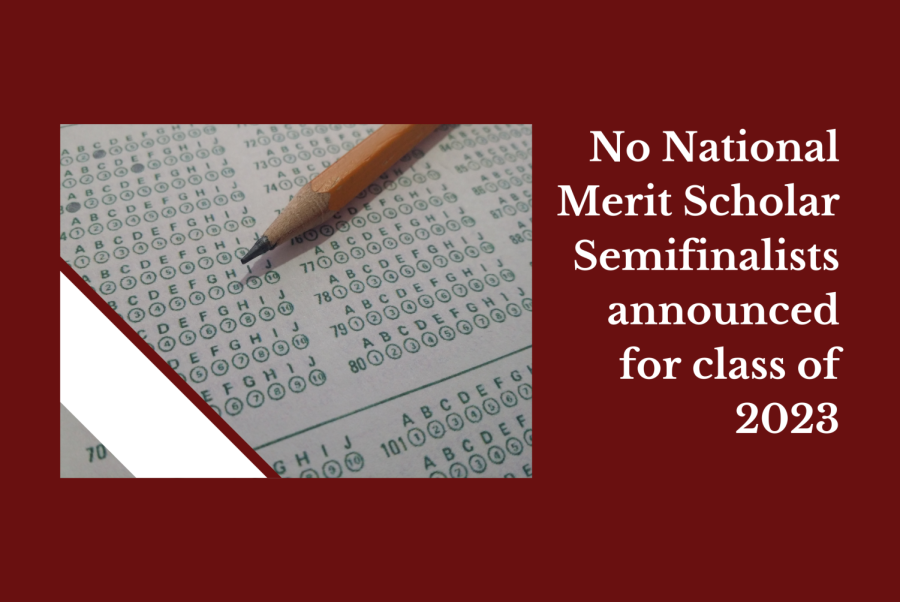No National Merit Scholar Semifinalists announced for class of 2023
Nov 9, 2022
This previously ran in our October 2022 Print Issue.
Emmaus High School holds a history of producing at least one National Merit Scholarship Semifinalist every year for at least the past decade – leaving the community baffled when none were announced for the class of 2023.
The National Merit Scholarship Corporation (NMSC) is a non-profit organization that operates annual academic competitions based on the PSAT. Students taking the PSAT in their third year of high school will have the opportunity to earn merit-based scholarships depending on their scores. The NMSC annually recognizes about 16,000 Semifinalists in the fall: around 95% become finalists, half of which will be awarded scholarships in the spring. All scores (typically around 1.5 million entrants) are sent to the NMSC; 2% receive recognition via a Letter of Commendation and 1% are deemed Semifinalists.
The score to determine which students are Semifinalists is subject to change, as it is reliant on the scores from that year. Scores are measured using a calculated index score, and this number is set at the “cut-off” score for students in that state. According to the Compass Education Group, in Pennsylvania, the cut-off index score was the same for the class of 2022 and 2023. Nationally, there was an overall decrease in cut-off scores this year.
Explanations of EHS’ results this year cannot be pinned to an exact source, but when looking for possible explanations, especially in math, students and teachers direct their attention to the effects of the pandemic and online school.
The PSAT requires knowledge of Algebra 1 and geometry. For the class of 2023, a large portion of students either took Algebra 1 in eighth or ninth grade – the year of shutdown. Geometry would then be taken in 10th or 11th-grade – the year of online school and the first year back in-person, respectively.
Math Department Chair Kimberly Adams commented she had no idea why there were no Semifinalists this year, but that the math department was hit hard due to the pandemic.
Another math teacher, Gitana Wasserman, added that online teaching was new to teachers as well as students, resulting in some teachers possibly needing to skip sections of Algebra 1 to get through material. Also, students had opportunities to take shortcuts they normally would not in an in-person setting.
“Students who worked online, Algebra 1, did a lot of… PhotoMath instead of actually doing the work themselves, thinking ‘Oh I got it done,’ but they didn’t actually think through it on their own,” Wasserman said. “So they lost a lot of skills that way too.”
However, East Penn was not the only school district to suffer a pandemic, and since the number of national semi-finalists did not change, there has to be another contributing factor.
Supervisor of Secondary Curriculum and Instruction for STEM Mike Mihalik reflects on how he has “a million questions” about the past few years. Regarding the pandemic, he recognizes that it was a global occurrence, but the individuals and schools handled it differently.
“Everyone went through the pandemic but not everyone went through it the same way,” Mihalik said. “The way that we went through it in East Penn is different than how maybe some other [districts]. It’s just different. You don’t all go through the same storm the same way.”
Polling students in English class showed that the majority who have taken the PSAT felt more comfortable on the English portion than the math. However, this was not the case for everyone.
“I am great at math, but not so great at analyzing and interpreting literature,” one student said.
Students who believed their performance was or possibly was affected by the pandemic and online school, reported that information did not sink in as well during online school and block scheduling was a challenge with half-year courses.
“I took it [the PSAT] the beginning of junior year after our full online year. I found that not being in a class setting for that long definitely affected my standardized test taking skills, as I hadn’t practiced the act of actually sitting down and taking a test for that long of a time,” another student said.
Supervisor of K-12 Curriculum and Instruction for Humanities Dr. Erin Murphy was disappointed at the lack of Semifinalists this year. Pre-pandemic, in 2019, the East Penn school board approved a new curriculum for the English department. However, according to Murphy, they were not able to implement this curriculum as they typically would due to the shut down and the more pressing issue of remote learning. With a lack of data to prove any correlation or causation, Murphy reports the change in curriculum did not have a correlation to PSAT performance.
“I think that unfortunately, until this year, we haven’t had a really good year to see that curriculum do the work we were hoping for it to do,” Murphy said. “So I think that if you looked at data, even pre-pandemic, we weren’t necessarily super happy with where that data was anyway, which was why we were seeing downward trends… and then the pandemic hit, and it was still not ideal, obviously.”
Another aspect of the pandemic are colleges going test-optional, decreasing the emphasis on standardized tests. However, survey results showed most students still believe the PSAT plays somewhat of a significant role in college admissions: on a scale of one to five (one being not important at all and five being extremely important), 66.8% rated importance a three or a four.
On the same thought, senior Lauren Dublin did not care about the National Merit Scholarship and she mostly saw the PSAT as an opportunity to study for the SAT.
“Honestly, I didn’t really care about the score, but I did better than I thought I would,” Dublin said. “I [don’t] see it [NMS] as important as using the PSAT to study, but if people are in school… they’ll hear more about it and they’ll care more about [it] if they see other students caring about it.”
Senior Supreeth Dmello did not perform as well as he wanted to, noting possible reasons as not studying, as well as inconsistency and stress from the testing in-person. He also sees the proctor’s overall attitudes as having a hand in the experience, especially those who openly state their discontent for being there.
“This was [my] first time entering the high school after a year of not being [there], which made it a little stressful,” Dmello said. “The first PSAT I took, they sent me to a room, and we sat there for over half an hour, past 8 a.m. and then they moved us to a room by Pine Street. So the inconsistency [played a role].”
The consensus among the EHS community is that there is no definite answer to explain why there are no Semifinalists.
Those who took Algebra 1 in ninth grade were exempt from the Keystone Exam the following year, making it difficult to measure how well students learned the material.
“It’s tough to answer a lot of questions without seeing specific data,” Mihalik said. “So here’s a good example with algebra: we can break down the algebraic Keystone by anchor by module. We’re always able to see, like, where our areas of strength, our areas of weakness. It’s nice to have that.”
With in-person school fully underway, Murphy is hopeful for the new curriculum plans and the future they will bring for students.
“I think that we’ve already picked up the ball again… we’re moving back in the direction that we started to move pre-pandemic,” Murphy said. “I’m optimistic that we’re going to be moving in the right direction again.”













TW • Jan 17, 2023 at 3:52 pm
No excuse, suspending this scholarship has happened in 12 Virginia high schools, and they are currently being investigated. No excuses for this.